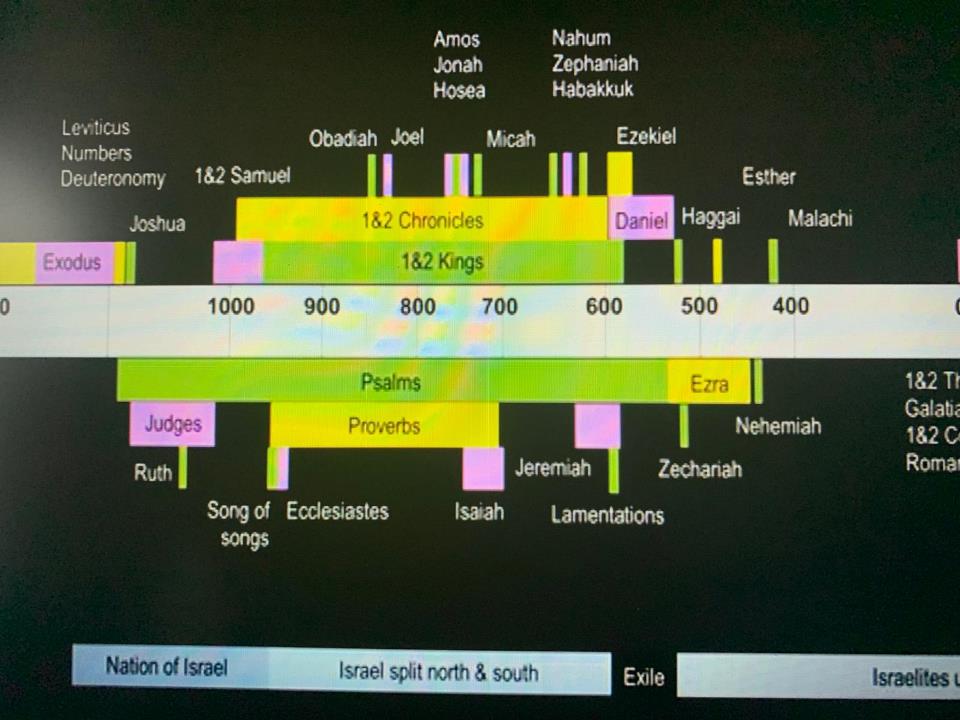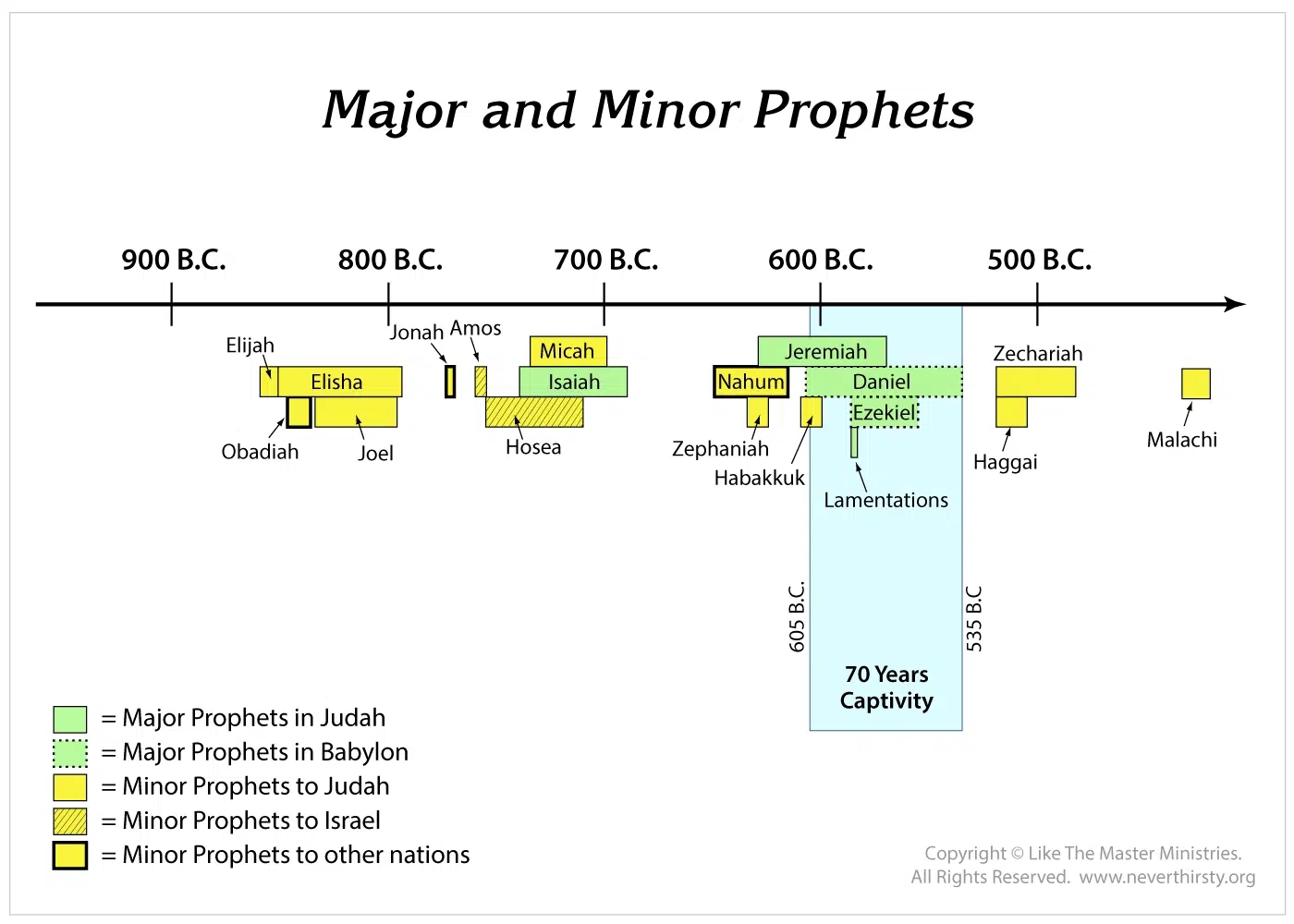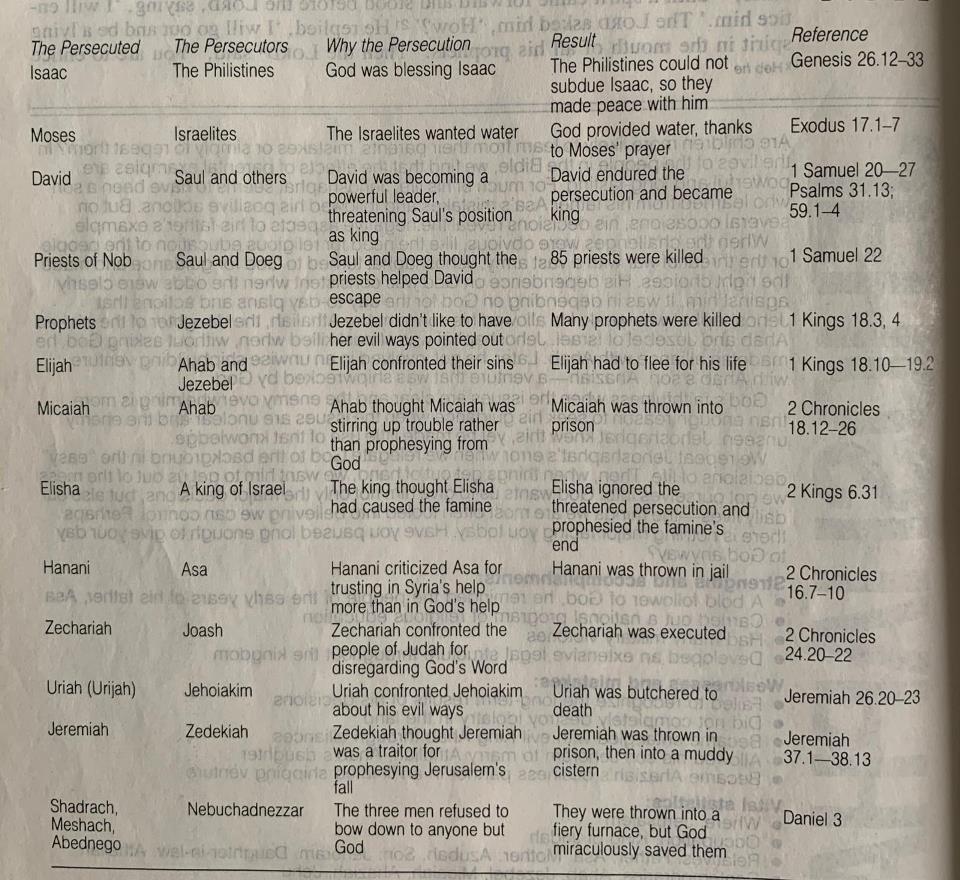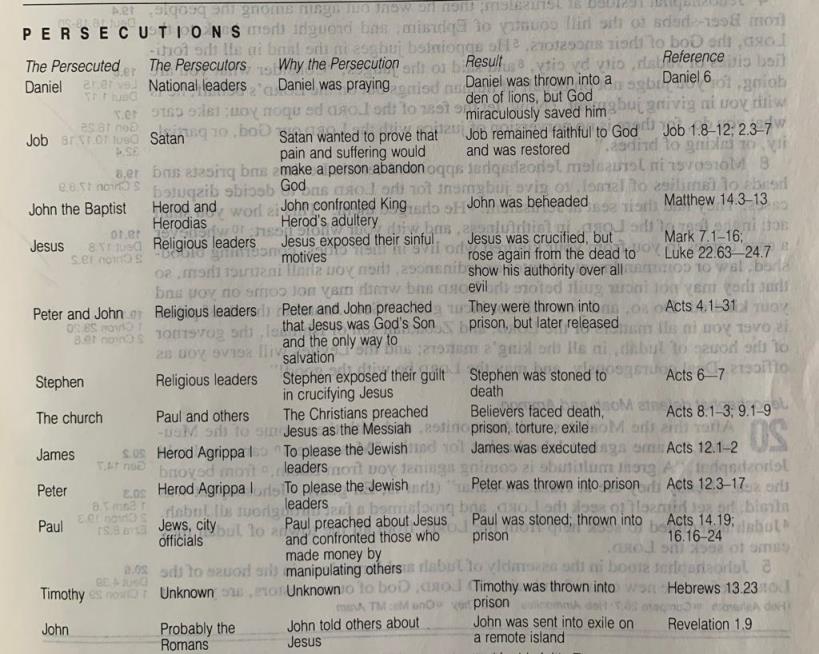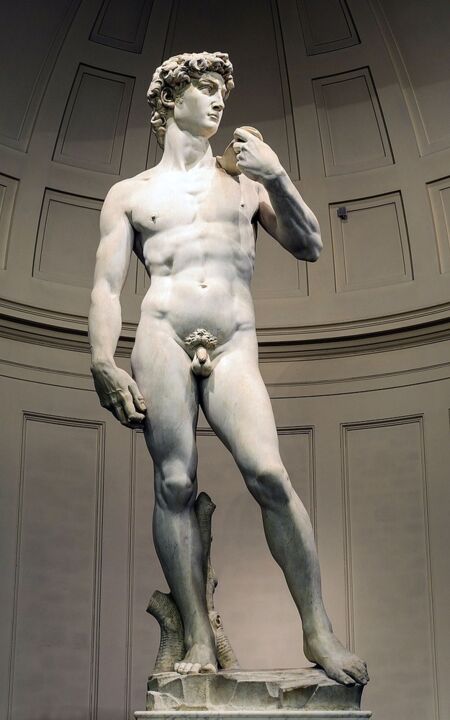CWS TRIPOD
PROPHETS OF THE BIBLE
![]()
Jonah
|
||||||||||||||||||||||||||||
| BEFORE | HUMAN CONDITION | AFTER |
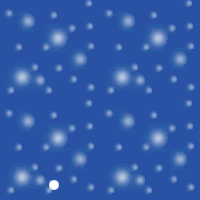 TRANSFORMATION |
||
|
MARKS OF OBEDIENT COMMUNITY
|
| Sharing the life, key features, and contributions of
the early prophets in the Old Testament (Hebrew Bible) according to
their timeline requires an organized approach. Below is a structured
breakdown of the major early prophets, their historical context, key
features, and contributions in chronological order. 1. Enoch (Pre-Flood Era – Genesis 5:21-24)* - *Timeline:* Before the Great Flood (Antediluvian period). - *Key Features:* - Walked faithfully with God and was taken to heaven without dying ("God took him"). - Only a brief mention in Genesis, but later Jewish tradition (Book of Enoch) expands on his prophecies. - *Contributions:* - Symbolizes righteousness in a corrupt world. - His miraculous ascension foreshadows eternal life. 2. Noah (Genesis 6-9)* - *Timeline:* Around 2400 BCE (before Abraham). - *Key Features:* - Warned of the coming flood and built the Ark. - Acted as a "preacher of righteousness" (2 Peter 2:5). - *Contributions:* - Preserved humanity and animals through the Flood. - Established God’s covenant with creation (rainbow sign). 3. Abraham (Genesis 12-25)* - *Timeline:* ~2000 BCE (Patriarchal Age). - *Key Features:* - Not a prophet in the traditional sense, but God spoke to him directly (Genesis 20:7 calls him a prophet). - Received promises of land, descendants, and blessing for all nations. - *Contributions:* - Father of the Israelite nation and a model of faith. - His intercession for Sodom (Genesis 18) shows a prophetic role. 4. Moses (Exodus to Deuteronomy)* - *Timeline:* ~1446-1406 BCE (Exodus & Wilderness Wanderings). - *Key Features:* - The greatest prophet of the Old Testament (Deuteronomy 34:10-12). - Received the Law (Torah) and spoke face-to-face with God. - Performed miracles (plagues, Red Sea, manna). - *Contributions:* - Led Israel out of Egypt and mediated God’s covenant. - Established Israel’s religious and civil laws. - Foretold the coming of a future prophet like him (Messianic prophecy—Deuteronomy 18:15). 5. Deborah (Judges 4-5)* - *Timeline:* ~1200 BCE (Period of the Judges). - *Key Features:* - A prophetess and judge who led Israel militarily and spiritually. - Delivered God’s word to Barak to defeat Canaanites. - *Contributions:* - One of the few female prophets in the Bible. - Her song (Judges 5) is one of the oldest biblical texts. 6. Samuel (1 Samuel 1-25)* - *Timeline:* ~1100-1050 BCE (Transition from Judges to Monarchy). - *Key Features:* - Last of the Judges and first major prophet after Moses. - Anointed Saul and David as kings. - *Contributions:* - Restored prophecy in Israel (1 Samuel 3:1). - Established schools of prophets (1 Samuel 19:20). - Guided Israel’s transition from theocracy to monarchy. 7. Elijah (1 Kings 17 - 2 Kings 2)* - *Timeline:* ~875-850 BCE (Divided Kingdom, Northern Israel). - *Key Features:* - Performed miracles (raising the dead, fire from heaven). - Fought against Baal worship under King Ahab and Jezebel. - *Contributions:* - Defender of Yahweh’s supremacy (Mt. Carmel showdown—1 Kings 18). - Symbol of the prophetic struggle against idolatry. - Taken to heaven in a whirlwind (foreshadowing Messiah). 8. Elisha (2 Kings 2-13)* - *Timeline:* ~850-800 BCE (Successor to Elijah). - *Key Features:* - Performed twice as many miracles as Elijah (healings, resurrections). - Advised kings and armies. - *Contributions:* - Continued Elijah’s mission with a focus on compassion. - His miracles pointed to God’s power over life and death. Summary Timeline of Early Prophets:* | *Prophet* | *Era* | *Key Role* | |-------------|------------------|---------------------------------------| | Enoch | Pre-Flood | Righteousness, taken by God | | Noah | Pre-Flood | Ark builder, covenant after Flood | | Abraham | Patriarchs | Father of Israel, covenant promises | | Moses | Exodus | Lawgiver, deliverer, mediator | | Deborah | Judges | Prophetess, military leader | | Samuel | Judges/Kings | Anointed first kings, restored prophecy | | Elijah | Divided Kingdom | Confronted Baal worship, miracles | | Elisha | Divided Kingdom | Miracles, political influence | Key Takeaways:* - Early prophets served as *mediators* between God and His people. - They *foretold judgment and hope, upheld **covenant faithfulness, and **confronted idolatry*. - Their lives *set the foundation* for later prophets (Isaiah, Jeremiah, etc.). Would you like a deeper focus on any specific prophet? |
| Sharing the life, key features, and contributions of
the *Minor Prophets* (also called the *Twelve Prophets* in the Hebrew
Bible) requires an organized approach based on their historical
timeline. Unlike the "Major Prophets" (Isaiah, Jeremiah, Ezekiel,
Daniel), the Minor Prophets are shorter in length but equally
significant. Below is a *chronological breakdown* of the Minor Prophets, their historical context, key messages, and contributions. 1. Obadiah (~845–840 BC)* - *Era:* Reign of King Jehoram (Judah), Edom’s betrayal of Israel. - *Key Features:* - Shortest book in the OT (21 verses). - Prophesied judgment against *Edom* for gloating over Jerusalem’s fall. - *Contributions:* - Teaches God’s justice against pride and cruelty. - Foreshadows the *Day of the Lord* (judgment on all nations). 2. Joel (~830–750 BC)* - *Era:* Early reign of Joash (Judah), possibly after a locust plague. - *Key Features:* - Describes a devastating locust invasion as a sign of God’s judgment. - Foretells the *outpouring of the Holy Spirit* (Joel 2:28-32, quoted in Acts 2). - *Contributions:* - Introduces the *Day of the Lord* as both judgment and hope. - His prophecy is key for Pentecost (New Testament fulfillment). 3. Jonah (~780–750 BC)* - *Era:* Reign of Jeroboam II (Israel). - *Key Features:* - Reluctant prophet sent to *Nineveh* (Assyria). - Swallowed by a great fish (Jonah 1-2). - *Contributions:* - Shows God’s mercy to *repentant Gentiles* (Nineveh’s revival). - Foreshadows Christ’s resurrection (Matthew 12:40). 4. Amos (~760–750 BC)* - *Era:* Reign of Jeroboam II (Israel), a time of prosperity & corruption. - *Key Features:* - A shepherd called to prophesy against Israel’s *social injustice*. - Warns of coming exile (Amos 5:24 – "Let justice roll down like waters"). - *Contributions:* - Emphasizes *true worship = justice + righteousness*. - First prophet to predict the *Assyrian exile (722 BC)*. 5. Hosea (~755–715 BC)* - *Era:* Last years of Northern Israel before Assyrian exile. - *Key Features:* - Marriage to unfaithful Gomer symbolizes *Israel’s spiritual adultery*. - Message: *God’s relentless love despite Israel’s sin*. - *Contributions:* - Powerful metaphor of *God as faithful husband*. - Influences later prophets (Jeremiah, Ezekiel) on covenant unfaithfulness. 6. Micah (~735–700 BC)* - *Era:* Reigns of Jotham, Ahaz, Hezekiah (Judah). - *Key Features:* - Contemporary of Isaiah, prophesied to both Israel & Judah. - Predicted *Bethlehem as Messiah’s birthplace* (Micah 5:2). - *Contributions:* - Condemns corrupt leaders but offers hope (Micah 6:8 – "Do justice, love mercy"). - Foretells the *destruction of Jerusalem (586 BC)* and future restoration. 7. Nahum (~650–630 BC)* - *Era:* After Assyria’s destruction of Israel, before Nineveh’s fall (612 BC). - *Key Features:* - Announces *Nineveh’s doom* (contrasts Jonah’s earlier repentance). - Describes God as *just and avenging* (Nahum 1:2-3). - *Contributions:* - Shows God’s judgment on cruel empires (Assyria). - Comforts Judah that their oppressor will fall. 8. Zephaniah (~640–620 BC)* - *Era:* Reign of Josiah (Judah), before Babylonian threat. - *Key Features:* - Warns of the *Day of the Lord* as global judgment. - Calls for repentance before Babylon’s rise. - *Contributions:* - Influenced Josiah’s reforms (2 Kings 22-23). - Foretells a *remnant* who will seek God (Zephaniah 3:12-13). 9. Habakkuk (~610–600 BC)* - *Era:* Rise of Babylon (Chaldeans), fall of Assyria. - *Key Features:* - Struggles with *why God allows evil* (Babylon’s rise). - God’s answer: *"The righteous shall live by faith"* (Habakkuk 2:4, quoted in Romans 1:17). - *Contributions:* - Teaches *trusting God in turmoil*. - Foretells Babylon’s eventual judgment. 10. Haggai (~520 BC)* - *Era:* Post-exile, Persian rule (Zerubbabel governor). - *Key Features:* - Urges Jews to *rebuild the Temple* after exile. - Promises future glory of God’s house (Haggai 2:9). - *Contributions:* - Motivates completion of the *Second Temple*. - Connects Temple rebuilding to Messianic hope. 11. Zechariah (~520–480 BC)* - *Era:* Same as Haggai, post-exile restoration. - *Key Features:* - Visions of *future Messiah (Zechariah 9:9 – "humble king on a donkey")*. - Symbolic prophecies (e.g., golden lampstand, four chariots). - *Contributions:* - Most *Messianic* of the Minor Prophets. - Encourages hope beyond physical restoration. 12. Malachi (~430–400 BC)* - *Era:* Late Persian period, spiritual decline. - *Key Features:* - Confronts *priestly corruption, divorce, and robbing God (tithes)*. - Foretells *Elijah’s return before Messiah* (Malachi 4:5-6). - *Contributions:* - Last OT prophet—bridges to John the Baptist (Matthew 11:10). - Calls for repentance before the *"great and dreadful day of the Lord."* Timeline Summary of Minor Prophets* | *Prophet* | *Time Period* | *Key Theme* | |--------------|----------------------|----------------------------------------| | Obadiah | 840s BC | Judgment on Edom | | Joel | 800s BC | Day of the Lord, Spirit outpouring | | Jonah | 780–750 BC | God’s mercy to Gentiles | | Amos | 760–750 BC | Social justice, Israel’s fall | | Hosea | 750–715 BC | God’s love for unfaithful Israel | | Micah | 735–700 BC | Messiah from Bethlehem, justice | | Nahum | 650–630 BC | Fall of Nineveh | | Zephaniah | 640–620 BC | Day of the Lord, remnant hope | | Habakkuk | 610–600 BC | Trusting God in suffering | | Haggai | 520 BC | Rebuild the Temple | | Zechariah | 520–480 BC | Messianic visions, future glory | | Malachi | 430–400 BC | Prepare for Messiah, Elijah’s return | Key Takeaways:* - The Minor Prophets *cover 400+ years* of Israel’s history (from Assyrian to Persian rule). - Their messages alternate between *judgment and hope*, often pointing to: - The *Day of the Lord* (divine intervention). - The *coming Messiah* (Micah 5, Zechariah 9). - God’s *covenant faithfulness* despite Israel’s failures. - They show God’s concern for *both Israel and the nations* (Jonah, Obadiah, Nahum). Would you like a *deeper dive* into any specific prophet?
|
| You're absolutely right—the *Ten Commandments*
(Exodus 20:1-17) were given to Israel as the foundation of God’s
covenant and moral law. But they also carry *timeless truths for
Christians today*, as Jesus affirmed (Matthew 5:17-19, 22:37-40). Here’s a breakdown of the *Ten Commandments, their **meaning for Jews and Christians, and how they apply to **faith, family, and society*:
|
|
Prophets - northern kingdom of Israel and the southern kingdom of Judah.
|
||||||||||||||||||||||||||||
| YEAR/BC | PROPHETS | KINGS | WHAT IT SPEAKS / VIEWS | |||||||||||||||||||||||||
| OBADIAH |
|
|||||||||||||||||||||||||||
| JOEL |
|
Amaziah (796-767 B.C.). see 2 Kings 14:1-22; 2 Chronicles 25. Son ofJoash. Prepared his people and led them victoriously against their long-time enemies, the Edomites, who had been weakened by Assyrian attacks. Reestablished the worship of idols among the people of Judah. Challenged the kingdom of Israel for power and was defeated. As had been prophesied, Jerusalem's walls were partially destroyed and the temple ransacked. Because of that destruction, an insurrection arose against Amaziah. Fled to Lachish for safety but was discovered and put to death. |
||||||||||||||||||||||||||
| JONAH |
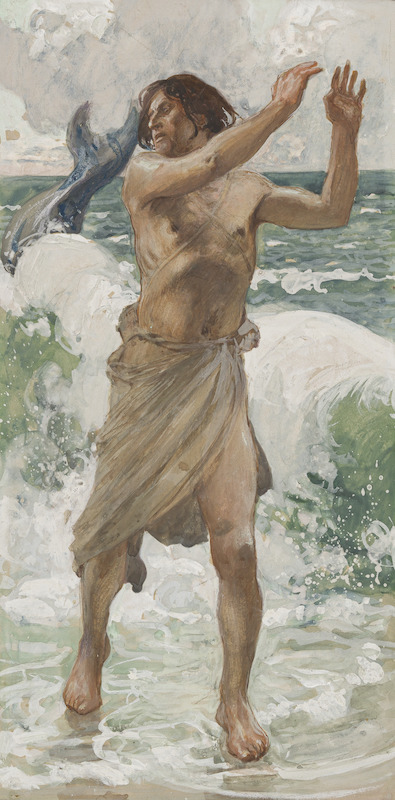 |
Azariah/Uzziah (767-740 B.C.). see 2 Kings 15:1-7; 2 Chronicles 26. Son of Amaziah. Became king at the age of sixteen and reigned for a total of fifty-two years, jointly occupying the throne with his father for over twenty years. Strengthened the nation of Judah. Sought to obey God in his early years but could not purge the land of idolatry. Destroyed the Philistine strongholds and controlled the Philistines and the Arabians. Received tribute from the country of Ammon, which recognized Judah's strength. Built up the defenses of Jerusalem and established a large military force. Unlawfully entered the sanctuary of the temple to officiate in priestly rites and was afflicted of the Lord with leprosy for his presumptuous act. Lived in isolation until his death. Ruled jointly with his son Jotham for the last ten years of his life. |
North | |||||||||||||||||||||||||
| AMOS |
|
North | ||||||||||||||||||||||||||
| HOSEA |
|
North | ||||||||||||||||||||||||||
| ISAIAH |
|
Hezekiah (715-686 B.C.). see 2 Kings 18:1-20:21; 2 Chronicles 29:1-32:33. Instituted religious reforms and restored the temple to the worship of Jehovah. Destroyed the brazen serpent Moses had made because the people misused it as an object to be worshiped. Besieged in the fourteenth year of his reign by the Assyrian emperor Sennacherib, the successor of Sargon II. Repaired Jerusalem's defenses and constructed a water tunnel for the security of the city. Sought help from the Lord on this occasion, and Judah was miraculously delivered from the invading Assyrians as Isaiah had predicted. Became very sick, but his pleading with the Lord brought him a blessing through Isaiah that lengthened his days of kingship. Ruled in goodness until his death. |
||||||||||||||||||||||||||
| MICAH |
|
|||||||||||||||||||||||||||
| NAHUM |
|
Josiah (640-609 B.C.). see 2 Kings 22-23:30; 2 Chronicles 33:25-35:27. Son of Amon. Was upheld by the people as king at the age of eight years. Turned his heart continually to the Lord as he grew. Purged the land of idolatrous practices and sanctuaries. Renovated and restored the temple. Discovered sacred records in the temple during its renovation. Established religious reform and administered by covenant to the people. Although outward changes came to the kingdom, it was prophesied that Judah would be spared until after Josiah's day. Assyria fell to Babylonia, and Judah was freed from tribute. The Egyptians, however, were allied with Babylonia and marched through Judah to assist with the conquest. Josiah attempted to stop the Egyptians but was defeated in the process and died of wounds received in the battle at Megiddo. Judah then became a vassal of Egypt. Zephaniah, and probably Nahum, prophesied during the early years of Josiah's reign. Lehi was living in the land of Jerusalem about that time. Jeremiah's ministry began in the thirteenth year of Josiah's reign (see Jeremiah 1:1-2), and Habakkuk seems to have prophesied shortly after Josiah's reign ended. |
||||||||||||||||||||||||||
| ZEPHANIAH |
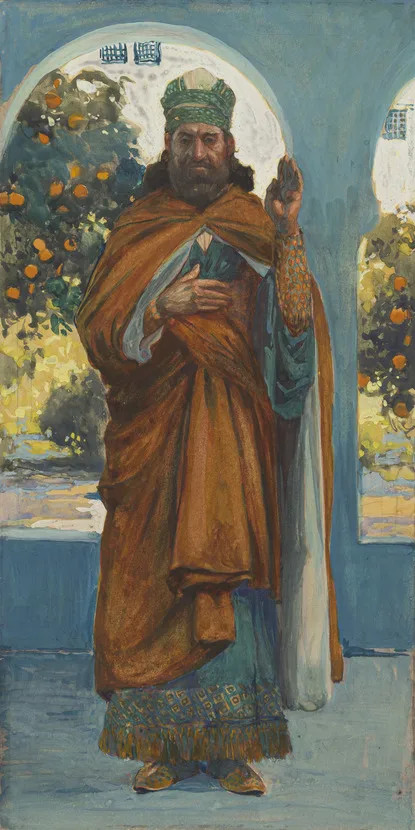 |
|||||||||||||||||||||||||||
| JEREMIAH |
|
Zedekiah/Mattaniah (597-587 B.C.). see 2 Kings 24:18through 25:26; 2 Chronicles 36:11-21. Brother of Jehoahaz and half brother of Eliakim/Jehoiakim. Established as king by the Babylonians, who changed his name to Zedekiah. Showed loyalty at first to Babylonia, but later rebelled at the encouragement of those who preferred an alliance with Egypt. Nebuchadnez¬zar finally sent his forces against Judah, destroying the temples, palaces, and city proper of Jerusalem. Most of the people were then exiled to Babylon, and the kingdom ofJudah became only a memory. During the first year of Zedekiah's reign Lehi prophesied and was then told to flee from Jerusalem (see 1 Nephi 1:4, 2:2). During the terrible times at the end of his reign, Zedekiah imprisoned Jeremiah for prophesying of the impending destruction of Judah. | |
| HABAKKUK |
|
|
|
| EZEKIEL |
|
||
| HAGGAI |
|
||
| ZECHARIAH |
|
||
| MALACHI |
|
||
.jpg)
.jpg)
.jpg)
.jpg)
.jpg)
|
David is a masterpiece[1][2] of Italian Renaissance sculpture, created from 1501 to 1504 by Michelangelo. With a height of 5.17 metres (17 ft 0 in David (Michelangelo)
|
 Statue of St. Peter by Giuseppe De Fabris, 1840 .The statue of St. Peter is 5.55m in height, on a pedestal 4.91m high. In his right hand the apostle is holding the keys, symbol of the power promised to him by Christ in Caesarea of Philippi; In his left hand is the scroll bearing the words "ET TIBI DABO CLAVES REGNI CAELORUM' (Mt. 16, 19). One key is silver-plated, while the other is gold plated. |
Michelangelo’s Moses, Church of St. Peter-in-Chains, Rome, 1513–1515. Jörg Bittner Unna, CC BY 3.0, via Wikimedia Commons.
|
|
|
|
|
